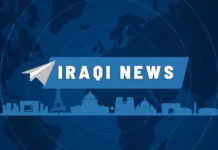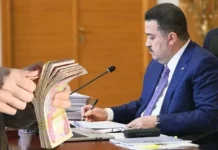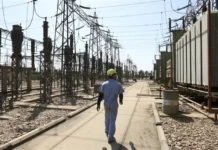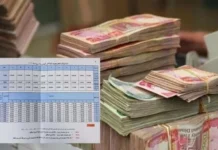Iraq Exports Nearly 100 Million Barrels Of Oil In A Month
Economy | 02:33 – 07/25/2025 Mawazine News – Baghdad The Ministry of Oil announced the total oil exports and revenues achieved for last June. The Ministry stated, in a statement received by Mawazine News, that “the quantity of crude oil exports amounted to (98) million and (882) thousand and (613) barrels (ninety-eight million and eight hundred and eighty-two thousand and six hundred and thirteen barrels).”
It added, “The revenues amounted to more than (6) billion and (698) million and (21) thousand dollars (six billion and six hundred and ninety-eight million and twenty-one thousand dollars).”
The statistics indicated that, “the total quantities of crude oil exported for the month of last June from the oil fields in central and southern Iraq amounted to (97) million and (718) thousand and (994) barrels, while exports from the Qayyarah field were (946) thousand and (741) barrels, while the quantity of exports to Jordan amounted to (216) thousand and (878) barrels.”
https://www.mawazin.net/Details.aspx?jimare=264215
Black Gold Prices Rise Globally
Economy | 11:43 – 07/25/2025 Mawazine News – Follow-up Oil prices rose on Friday as optimism over trade talks supported the outlook for the global economy and oil demand, overshadowing news of possible increased oil supplies from Venezuela.
US West Texas Intermediate (WTI) crude futures for September delivery rose 0.87% to $65.82 a barrel, while global Brent crude futures for the same month rose 0.79% to $69.05 a barrel. https://www.mawazin.net/Details.aspx?jimare=264212
Iraq Secures All Internal Oil Pipelines.
Energy Economy News – Baghdad The Ministry of Interior’s Energy Police Directorate confirmed on Friday that all oil pipelines inside Iraq have been secured, while explaining the use of advanced technologies to monitor them.
Director General of the Energy Police Directorate, Dhafer Al-Hussaini, said, “The oil derivatives transport lines are fully secured from south to north.”
He added that “all oil pipelines are protected by patrols and ambushes, in addition to the presence of thermal cameras and drones used to enhance protection,” stressing that “oil is secure throughout Iraqi territory.”
The Energy Police Directorate previously announced the adoption of strict new measures to monitor the movement of petroleum tankers, noting that tracking devices have been installed on 80% of the tankers.
The directorate’s director general, Major General Dhafer Al-Hussaini, said, “The Energy Police, in cooperation with the Ministry of Oil, have begun implementing a container tracking system. This is a modern technical procedure that involves installing a tracking device in each tanker. This device is linked to a special program supervised by an operations room at the Ministry of Oil. This program has also been provided to checkpoints spread throughout Iraq.”
He added, “The new system allows users to identify the location of the tanker’s loading, the condition of the container, the vehicle’s route, and all related information, which has significantly contributed to accelerating and facilitating audit procedures and preventing forgery or tampering with documents.”
He pointed out that “approximately 80% of tankers in Iraq, both private and government, have been fitted with tracking devices, while 10% have completed their procedures and are awaiting their turn to have the device installed. The remaining percentage is in the process of completing the procedures.” https://economy-news.net/content.php?id=57866
Iraqi Ports Introduce Fifth-Generation Equipment To Enhance Operational Efficiency.
Money and Business Economy News – Baghdad The General Company for Iraqi Ports announced on Friday the introduction of a new set of advanced “fifth generation” equipment aimed at increasing operational efficiency and accelerating container handling operations.
The company’s general manager, Farhan Al-Fartousi, said, “Iraqi Ports has received 14 advanced cranes, including four gantry cranes and ten RTG (rubber-tyre cranes), all of which are dedicated to container handling operations within the port yards.”
He added, “The new equipment was manufactured by the Chinese company ZBMC, according to the highest international technical specifications. It features the ability to operate within smart communications systems that contribute to accelerating performance by operating automatically without human intervention, significantly reducing handling time.”
Al-Fartousi explained that “the introduction of this technology represents a qualitative shift in the work of Iraqi ports, contributing to achieving unprecedented operational efficiency and enhancing Iraq’s ability to compete in the maritime transport and logistics sector.” https://economy-news.net/content.php?id=57857
Government Measures To Reduce Unfair Competition And Support Local Industry
Money and Business Economy News – Baghdad The Ministry of Commerce announced on Friday government measures to reduce unfair competition and support local industry.
Ministry spokesman Mohammed Hanoun said, “The government is working to re-evaluate previous decisions related to protecting local products, by reviewing customs duties imposed on imported goods and updating the reference prices used in customs valuation.”
He explained that “the aim of this measure is to ensure that customs tariffs are consistent with current economic realities and to enhance the protection of local products from unfair competition, particularly from imported goods that are cheap or subsidized in their countries of origin.”
He added, “The decision to review the assessment of customs duties imposed on imported goods will directly contribute to supporting local production by reducing unfair competition, increasing the competitiveness of national products in the Iraqi market, and encouraging local industrial and agricultural investment.”
He pointed out that “the measures typically include goods that have a locally produced equivalent within Iraq, such as processed food, agricultural products, electrical and household goods, building materials, clothing, and textiles,” noting that “goods that are unavailable or not sufficiently produced locally will not be included in these measures.”
Regarding achieving a balance between protecting local products and ensuring consumer interests, Hanoun emphasized that “this will be achieved by imposing carefully considered customs duties that do not significantly raise prices for consumers, adopting updated and fair pricing for goods, supporting local production quality and efficiency, and strictly monitoring markets to prevent manipulation and monopoly.”
He pointed out that “the measure will also help curb the smuggling of goods by unifying fees and pricing to reduce the incentives for smuggling, tightening controls at border crossings based on reference prices, and using electronic systems to match shipments, in addition to enhancing cooperation between customs and security and intelligence agencies.”
The Council of Ministers had approved in its last session the imposition of an additional customs duty of (40%) of the value of the unit of measurement of the imported product, adhesives for tiles and ceramics, from all sources, for a period of 4 years, and monitoring the local market during the application to verify the impact, and the General Authority of Customs shall apply the additional customs duty for the aforementioned product and notify the Ministry of Industry and Minerals periodically about the quantity of imports, and the decision shall be implemented 120 days after its issuance.
85 views Added 07/25/2025 – 2:27 PM https://economy-news.net/content.php?id=57861
Gold Declines As Dollar Recovers
Stock Exchange Gold prices fell in trading on Friday, July 25, affected by a recovering dollar and signs of progress in trade negotiations between the United States and the European Union, which reduced demand for safe havens.
Spot gold fell 1% to $3,335.45 per ounce, but remains up about 0.4% since the beginning of the week. US gold futures also fell 0.8% to $3,345.20.
The dollar index recovered from its lowest level in more than two weeks, making the precious metal more expensive for holders of other currencies, while benchmark 10-year US Treasury yields rose.
“The agreement reached by Japan is significant, and there is hope for a deal between the US and the EU before the August 1 deadline. This weakens demand for safe havens, as increased risk appetite pushes capital towards riskier assets,” said Peter Grant, vice president and senior metals analyst at Zaner Metals.
Two European diplomats reported that the United States and the European Union are close to concluding a trade agreement that could include imposing a general 15% tariff on European goods, following Washington’s agreement with Japan.
The S&P 500 and Nasdaq hit new record highs on Thursday, as investors’ risk appetite improved amid signs of easing trade tensions. US data showed an unexpected drop in unemployment claims last week, indicating a stable labor market despite a slowdown in hiring.
The Federal Reserve is expected to keep interest rates unchanged at its meeting on July 29 and 30, while markets are pricing in a rate cut in September. Other precious metals performance:
Silver fell 0.4% to $38.91 per ounce, heading for a weekly gain of 2%.
Platinum fell 1.6% to $1,229.94. Palladium rose 0.9% to $1,238.73. https://economy-news.net/content.php?id=57878






